As we move through 2025, the shelf life of skills is shrinking and learner demands are changing. The result? Traditional training programs are struggling to keep up.
Meanwhile, every dollar spent on training is under a microscope, with leadership demanding measurable training ROI.
Modern eLearning is one of the most effective ways to bridge the skills gap, address learner needs, and prove the value of your L&D investments. But even eLearning isn’t a fixed commodity. eLearning trends evolve over time. So, to maintain a competitive edge, and keep training on point, it’s vital to track developments across the digital learning landscape.
To build a future-ready workforce in 2025, we’ve researched the 11 eLearning trends it pays to have on your radar.
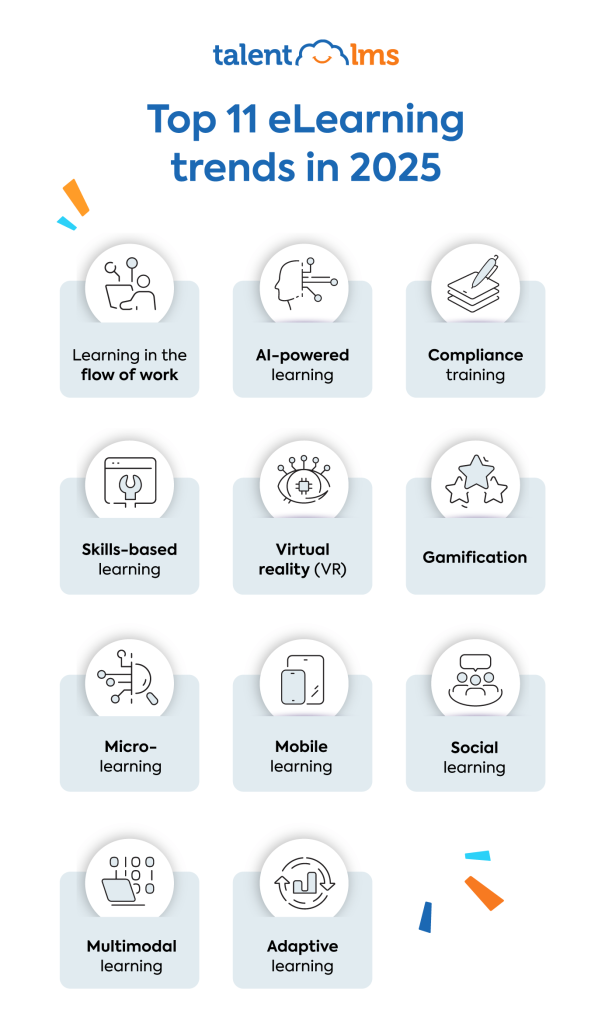
The 11 top eLearning trends and predictions for 2025
From personalized, adaptive learning to immersive VR and the power of social connection, let’s explore the digital training landscape this year and beyond.
1. Learning in the flow of work
The first item on our list of eLearning trends comes from a ‘Keep it Simple’ podcast discussion about the future of workplace training in 2025. Here, Brent Skinner, an accomplished SME in human capital management, highlighted the growing importance of learning in the flow of work within the context of wider workplace trends,
Learning in the flow of work is about delivering small, highly relevant pieces of information precisely when and where they’re needed.
This approach minimizes disruption, maximizes knowledge retention, and directly translates the whole learning process into improved performance.
It also aligns perfectly with modern workforce preferences. As highlighted in a LinkedIn Learning report, 68% of employees prefer to fit learning into their busy schedules at work.
What that looks like:
Instead of lengthy lectures, a customer service representative can instantly access a 30-second video tutorial on handling a specific customer complaint while they’re on a live chat. Or a sales rep can receive a microlearning module on a new product feature just before a client meeting.
2. AI-driven skills gap analysis and predictive learning
A significant limitation of a traditional skills gap analysis is its reactive nature. Problems are typically identified only after they’ve already impacted performance.
AI-powered LMS tools provide a fundamentally different (and more effective) approach. Instead of reacting to skills shortages after they hinder performance, organizations can now anticipate and address them before they happen.
This is becoming increasingly important, particularly in the realm of AI. Almost half of employees (49%) say AI is advancing faster than their company’s training programs are keeping up. It’s a potential skills chasm that needs urgent attention.
By optimizing this approach, HR and L&D teams can craft precise training programs, create personalized, timely learning experiences, and make informed hiring decisions – all based on hard data.
What that looks like:
Your marketing department might be gearing up for a major data-driven campaign six months from now. An AI-driven system can identify a looming demand for data analysis skills today, helping you to implement targeted training well in advance. Similarly, a planned cloud migration might expose a need for cybersecurity expertise, which the AI can flag long before it becomes a crisis.
3. Next generation compliance training
Compliance training, whether through eLearning or traditional learning, often gets a bad rap – and for good reason. Mandatory compliance modules can feel like a box-ticking exercise, disengaging employees and yielding minimal real-world impact.
This is, in part, due to inherent limitations of how we retain information. As the forgetting curve demonstrates, without reinforcement newly acquired knowledge rapidly disappears. Most research puts the figure as high as 90% in a week.
Next generation compliance training is a new eLearning trends that flips the script by helping you prioritize essential compliance knowledge. And then deliver it in a way that’s actually effective and boosts retention.
What that looks like:
Rather than a generic data privacy lecture, a sales team might receive targeted microlearning modules. These could focus on handling customer data appropriately during specific interactions, like email communication or CRM updates. Or, a customer service team could get scenario-based training.
4. Skills-based learning pathways and dynamic reskilling
Our next eLearning trend is also one of the top learning and development trends for 2025. Skills-based learning pathways, delivered through modern eLearning platforms, offer personalized journeys focused on developing specific, in-demand competencies.
For example, skills like “data-driven decision-making,” “agile project management,” or “cross-functional collaboration,” rather than generic “leadership training.”
These pathways lean on the flexibility of eLearning. Using microlearning modules, online courses, virtual mentoring, and interactive on-the-job projects training can be tailored to each employee’s skill level and career goals.
What this looks like:
A Customer Support Specialist wants to progress from mastering product knowledge and troubleshooting to advanced problem-solving, upselling, and strategic customer success management. Through interactive training, role-based assessments, and real-world application, they develop the skills needed to advance into roles like Customer Success Manager or Product Training Lead.
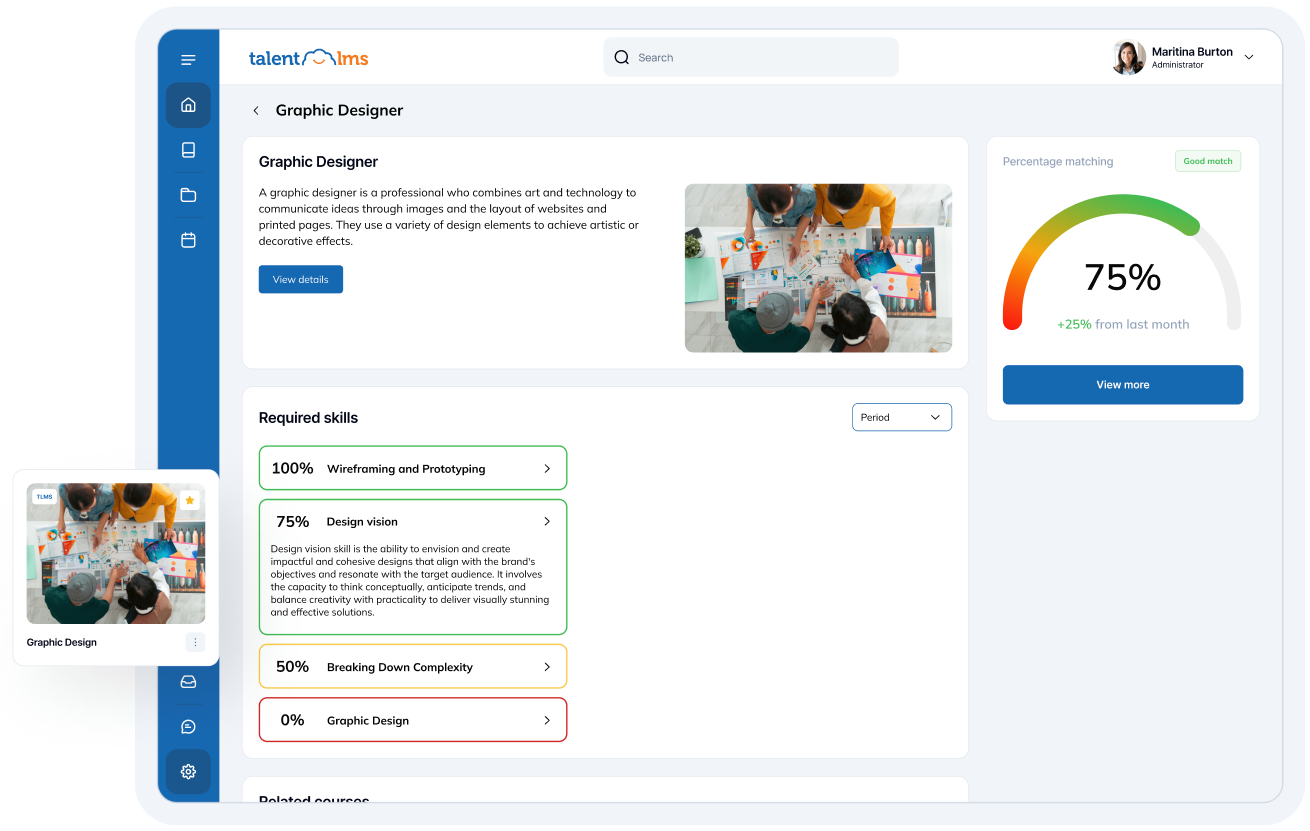
5. Virtual reality (VR) for immersive skill development
Virtual reality training (the digital counterpart of augmented reality) first went mainstream a few years ago. But it still ranks as one of the top eLearning trends. The initial hype might have been overdone, but modern VR simulations are making massive strides.
eLearning VR lets employees practice intricate procedures, build muscle memory, and make crucial decisions without real-world risks.
What this looks like:
Instead of reading about data protection, employees can use a VR simulation that lets them experience and respond to a data breach, helping employees fully grasp the severity of the situation and, most importantly, how to avoid it.
6. Gamification
Gamification is another eLearning trend that’s stood the test of time. By adding game mechanics—points, badges, leaderboards, challenges, and rewards—to online learning platforms, training transforms from a passive obligation into an active, engaging experience.
This approach is proven to boost learner motivation and knowledge retention. No surprise, then, that it’s remained on the list of top eLearning trends as we move through 2025.
What this looks like:
Rather than clicking through slides, learners might earn points for completing modules, unlock badges for mastering skills, or compete with colleagues on a leaderboard. For example, employees in a cybersecurity training program could face a simulated “phishing attack” challenge, earning rewards for correctly identifying and reporting suspicious emails.
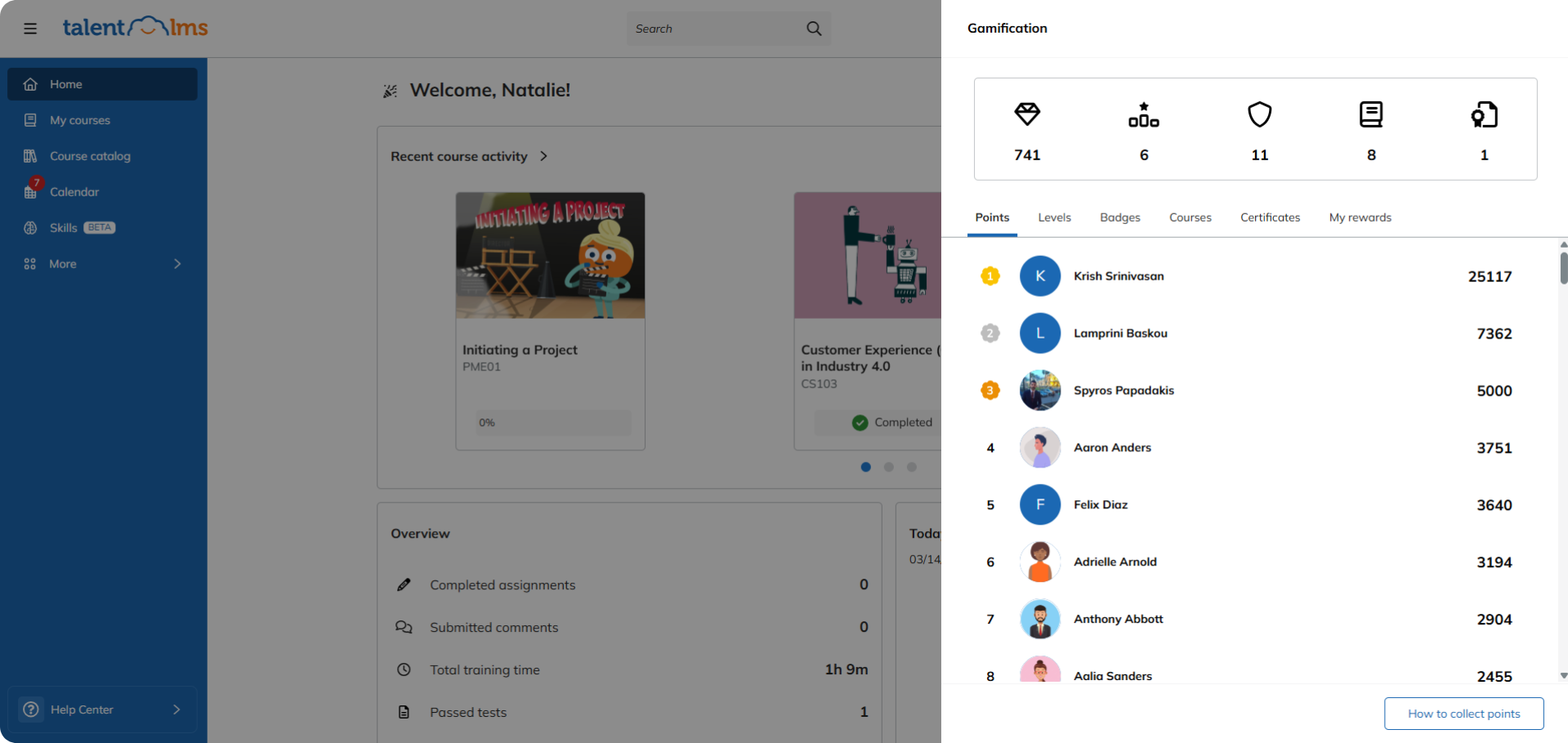
7. Microlearning
In 2023, the global market for microlearning was estimated at US$3.4 billion. By 2030, that number is expected to more than double.
Microlearning is a core trend in modern eLearning, that addresses the challenge of shrinking attention spans and the increasing demand for just-in-time information. It breaks down complex topics into short, focused learning modules, like TalentLibrary, typically lasting from a few seconds to a few minutes. And is delivered directly through online learning platforms.
What this looks like:
As opposed to skim-reading lengthy eLearning courses, employees might access a short video tutorial explaining a specific software feature. They might take part in a quick quiz to reinforce key concepts. Or refer to an infographic summarizing best practices. This preference for concise learning is substantiated by research from Software Advice, which indicates that 58% of employees are more inclined to engage with online learning when it is presented in shorter segments.
These “bite-sized” learning experiences can be accessed on any device, at any time, making it ideal for on-the-go learning and performance support.

Meet TalentLibrary™
A growing collection of ready-made courses that cover the soft skills
your teams need for success at work![]()

8. Mobile learning
Mobile learning is a dominant trend in eLearning, empowering employees with self-service access to training. With smartphones and tablets ubiquitous, learning is flexible and no longer confined to the desktop or scheduled training sessions. It’s integrated into the workday, and available whenever or wherever needed.
Mobile learning apps or platforms deliver a dynamic range of eLearning content. This can range from bite-sized microlearning modules and engaging podcasts to comprehensive online courses, and instant-access performance support.
What this looks like:
A field technician, struggling with a faulty valve, can instantly access a step-by-step repair guide, delivered through the company’s mobile learning app, on their tablet. Similarly, a sales representative, moments away from a major client meeting, can refresh their product knowledge with a quick mobile learning briefing. Or a new hire can complete preliminary onboarding training, delivered via mobile modules, during their commute, hitting the ground running on day one.
9. Social learning
Social learning taps into our innate human desire to connect and learn from one another. Within an eLearning context, it means moving away from isolating online education and using platforms that enable social learning and interactions.
Modern eLearning platforms incorporate social learning features like: discussion forums, group projects, peer feedback mechanisms, and integrated communication tools. These features let employees connect with colleagues, ask questions, share insights, and learn from each other’s experiences.
This aligns with research from MIT, which demonstrates that teams who effectively share knowledge are more innovative and achieve superior performance.
What this looks like:
Employees might participate in a discussion forum about a new company policy, collaborate on a project using a shared online workspace, or provide feedback on a colleague’s presentation through a video annotation tool.
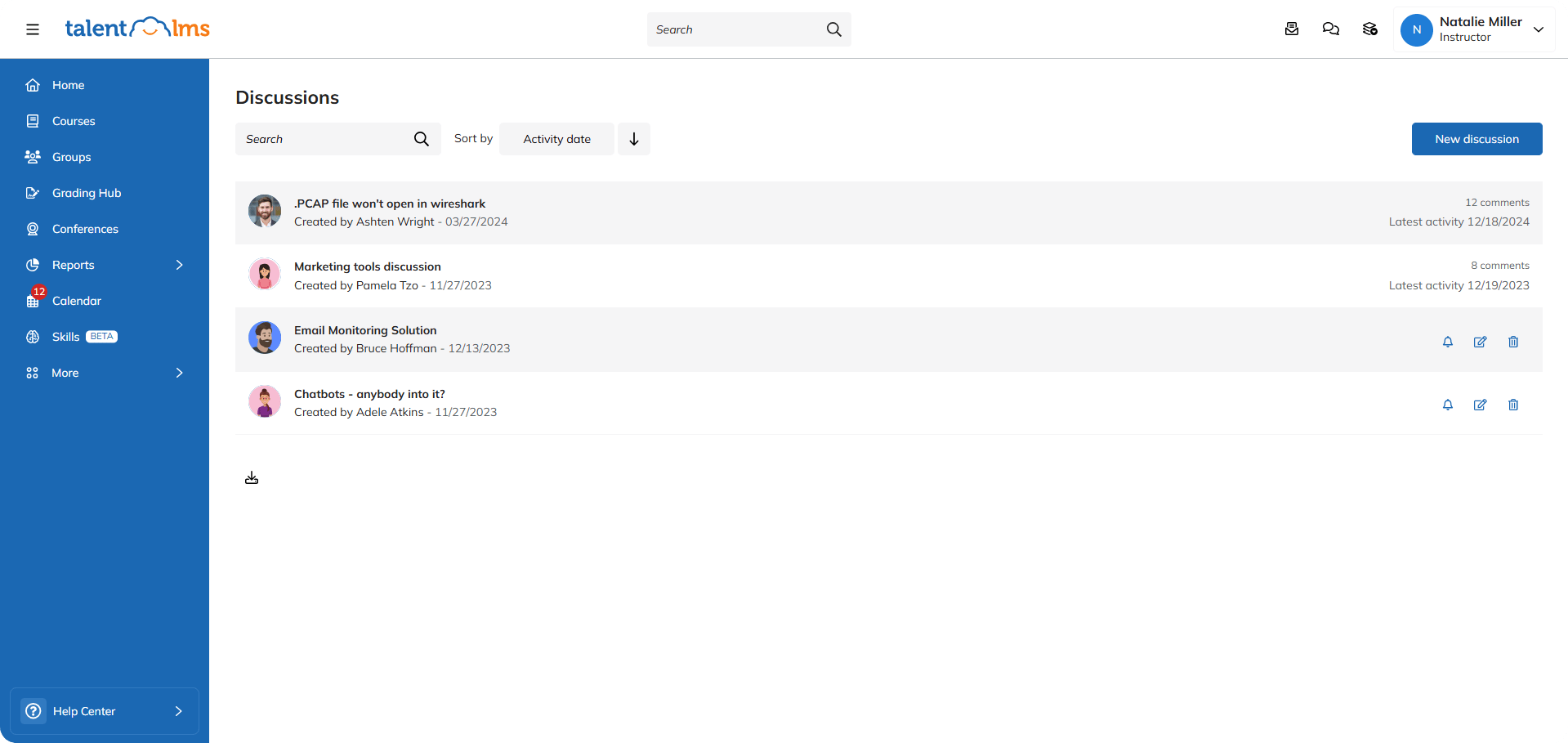
10. Adaptive learning
Adaptive learning is changing eLearning by tailoring the learning experience to each employee’s needs and pace. Using algorithms, these platforms analyze a learner’s performance in real-time, adjusting the difficulty, content, and even the learning path itself to optimize knowledge acquisition.
If a learner struggles with a particular concept, the system might offer additional explanations, practice exercises, or alternative learning resources. If a learner demonstrates mastery, the system can accelerate their progress, skipping over material they already know.
What this looks like:
An employee learning a new software program, for example, might receive extra guidance on features they find challenging, while quickly moving past those they grasp easily.
11. Multimodal learning
Employee engagement with online coursework often flatlines.
This usually happens because when eLearning programs rely on a single, monotonous delivery method. For example, endless slides or videos.
Multimodal instruction combats this directly. It delivers content through a variety of formats: short videos, podcasts, infographics, interactive simulations, and even curated external resources.
This blended approach drives better comprehension and, crucially, better on-the-job application.
A new hire, for example, could watch a quick product demo, then practice using the software in a simulated environment. They could, then, finally review key features in a one-page cheat sheet. Similarly, a seasoned sales rep could listen to a podcast interview with a top performer, analyze competitor data presented in an interactive infographic, and then practice handling objections through a VR role-playing scenario.
The challenges and limitations of adopting new eLearning trends
Embracing new eLearning trends offers immense potential, but it’s not always a walk in the virtual park. Succeed often hinges on a clear understanding of the potential challenges and limitations. Knowing what these are means you can then adapt or prepare for them. With that in mind, let’s walk through the three most common ones.
Budget constraints and proving ROI
The challenge: Securing funding for new eLearning technologies can be a significant obstacle to adopting new eLearning trends, particularly when budgets are tighter than a drum.
On top of that, once you do get funding, you need to further justify the investment. This means demonstrating a clear ROI — a monumental task in itself.
The solution: Many modern eLearning platforms come with built-in data analytics for tracking and measuring the impact of learning initiatives. This can help both secure and solidify investment.
Employee adoption and engagement
The challenge: Introducing new eLearning technologies or digital learning trends often faces resistance from learners themselves.
Employees may be comfortable with existing methods, skeptical of the new tools’ value, or simply overwhelmed by the prospect of learning another system. As a result, inertia, fear, or distrust, can significantly hinder the successful implementation of even the most advanced eLearning platforms.
The solution: Overcoming this requires you to lean on the trends we’ve discussed, here. Gamification, for example, can make learning more engaging. Personalized learning paths can cater to individual needs. And mobile accessibility can fit learning into busy schedules. Similarly, share relevance statistics from internal reports with learners to demonstrate value and boost adoption.
Content creation and curation
The challenge: Developing high-quality, engaging eLearning content is resource-intensive. Keeping that content current in a rapidly evolving landscape presents an additional challenge.
The solution: Using AI-powered content creation tools and adopting a blended approach can help address this. Access to an LMS with a built-in content library is also a game-changer. Remember to combine internal expertise with external resources to create content that’s tailored and targeted to you and your learners.
How to implement new online learning trends: 6 best practices
Implementing cutting-edge eLearning tactics requires a strategic approach, not a blind leap of faith.
Here are six best practices to guide your efforts:
1. Start with a clear needs assessment
Before you dive into the shiny new tech, figure out what your organization actually needs. Conduct a thorough needs assessment to identify skill gaps, learning objectives, and specific business goals. This is your roadmap to ensure you don’t build a highway to nowhere.
2. Choose the right technology partner
Don’t get seduced by flashy features. Select a vendor with a proven track record, a robust and user-friendly platform, and excellent support. A good rule of thumb is to see how each vendor balances future-focused technical capabilities with on-the-ground customer-focused interactions and rich resources.
3. Pilot and iterate
Don’t roll out everything to everyone all at once. Start with a small pilot group, gather feedback (the good, the bad, and the ugly), and make adjustments before a full-scale launch. Think of it as your dress rehearsal so that you’re ready for opening night.
4. Design for engagement
Design your eLearning to actively involve learners:
- Make the material directly relevant to their work, using real-world examples
- Deliver content in short, focused bursts (microlearning) to maintain attention
- Create customized learning paths to give your users choice
- Provide immediate feedback through quizzes and interactive exercises
5. Sell the story
Rolling out a new eLearning approach isn’t just about designing and then delivering new training. It’s about gaining employee buy-in to ensure adoption, engagement, and long-term success. Most times, this doesn’t come naturally, or easily. Which means you need to put work into creating a buzz.
To build excitement and boost engagement, choose several champions at different levels of the organization. Equip them with the information and resources they need to spread the word and generate excitement. Align this with a planned internal comms campaign, teaser emails, quizzes, and messaging that helps learners understand the “why” behind the changes. Most importantly, what’s in it for them, personally and professionally.
6. Train your trainers
Don’t overlook the crucial role of your training staff. The success of your program hinges on the quality of your trainers. Prepare them in advance and make sure they have the confidence and knowledge to deliver and lead your new approach.

Is eLearning the future?
eLearning is no longer a big part of modern corporate training—it is modern corporate training.
The future of corporate learning is undeniably digital. It’s also constantly evolving. The real question is how effectively organizations embrace its evolution.
For L&D teams, the big challenge isn’t just adopting digital learning but staying ahead of the trends that shape how employees engage, retain, and apply knowledge. It’s also about knowing what trends to run with and when.
Letting technology set the pace and dominate the agenda won’t work.
Success demands a commitment to continuous learning, a willingness to experiment, and a relentless focus on the learner experience. Plus a pragmatic and practical approach to implementation.
The trends in eLearning outlined here offer a roadmap to building a more engaged, skilled, and adaptable workforce.
But how you navigate that roadmap is yours to decide.
Originally published on: 15 Dec 2022 | Tags: eLearning,Trends


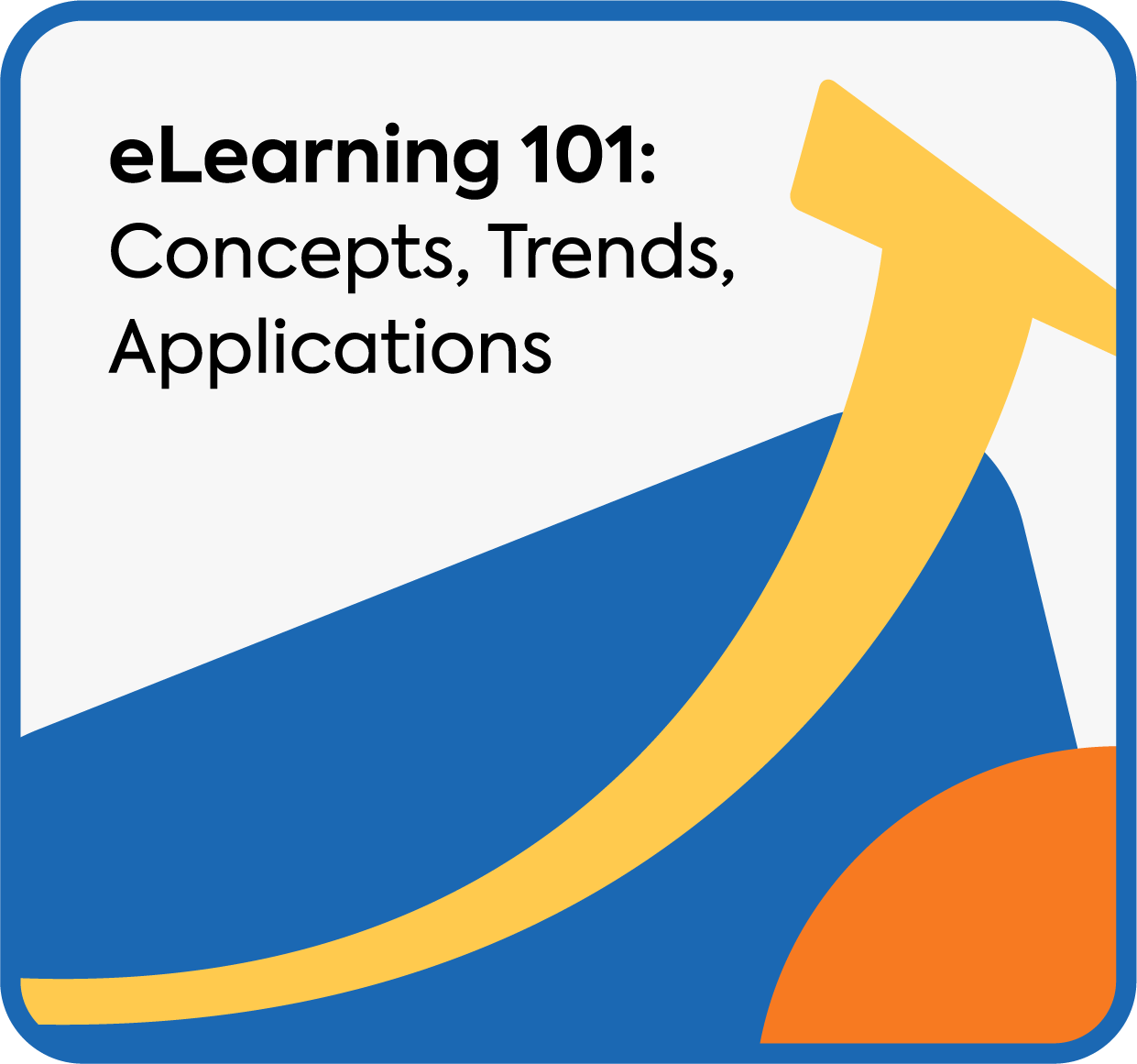

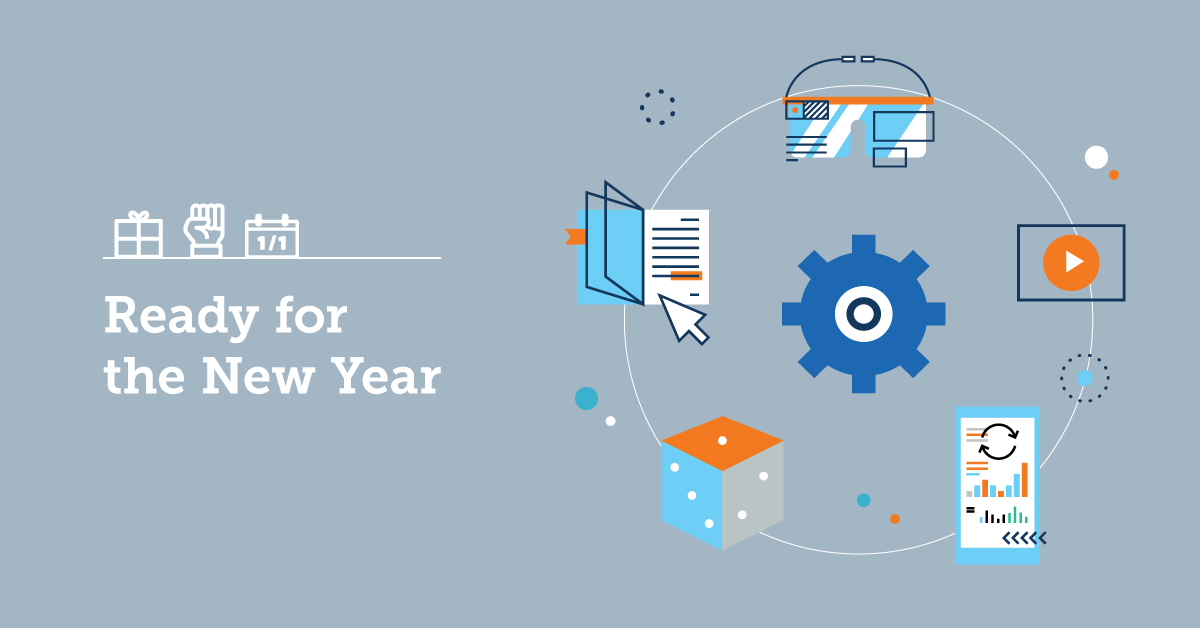
![7 Fresh Employee Onboarding Trends [2022 Update]](https://images.www.talentlms.com/blog/wp-content/uploads/2018/12/the-ultimate-stuff-onboarding-trends-2019.jpg)
